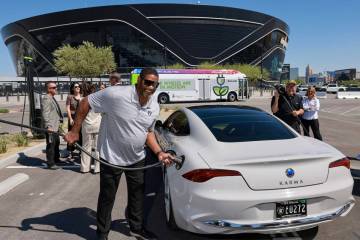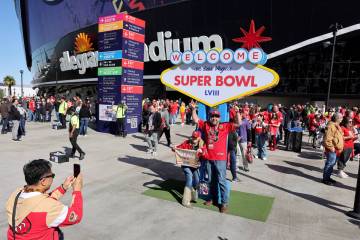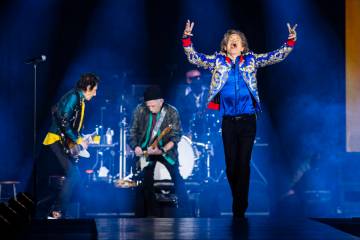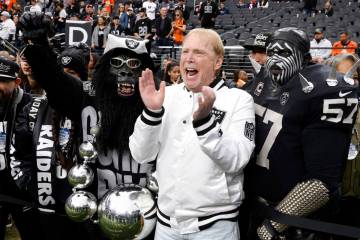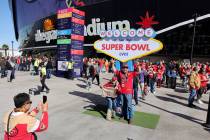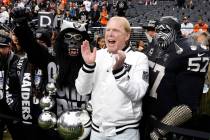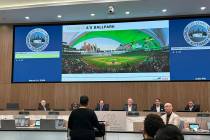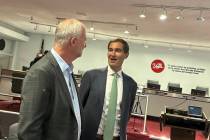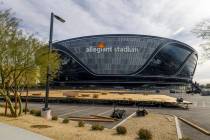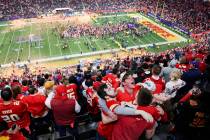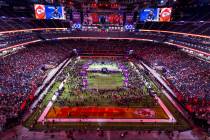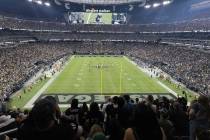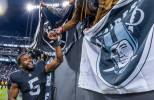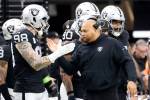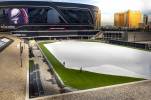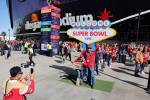Big-league sports boosts interest in Las Vegas Valley real estate
Southern Nevada real estate professionals already have seen indications of an anticipated climb in local land values as a result of Las Vegas’ leap into big-league status.
“Building a Big League City” was the theme of a forecast event for the Southern Nevada chapter of NAIOP, a commercial real estate organization, and the group on Thursday dissected issues with a panel representing the marketing side of arriving teams, a keynote speaker from Denver who witnessed a major turnaround for downtown Denver as a result of the construction of Coors Field and a panel of real estate professionals examining the region’s transition.
“The Raiders stadium project has spurred values in the area,“ said panelist Travis Nelson, vice president and commercial sales manager for First American Title.
He said a 2.5-acre parcel just north of the stadium site recently closed for $7.25 million.
“I think it’s also spurred a lot of activity on South Las Vegas Boulevard,” he said.
The stadium project as well as the Raiders’ planned practice facility and headquarters in Henderson have similarly boosted interest in the market, panelists said.
The rise in real estate prices has also contributed to a problem for the Raiders. With land costs exploding, the team has had difficulty finding land for offsite stadium parking necessitated by using acreage that isn’t big enough for the stadium and more than 16,000 parking spaces demanded by Clark County.
Real estate experts also voiced some concern about the sports boom boosting prices to make land for homes, offices and commercial unaffordable.
Another project that has generated interest in Southern Nevada: UNLV’s planned medical school. Panelists said the realization that the region has acknowledged a shortage of doctors and is doing something about it has produced feelers from companies looking to relocate.
But with the opportunity comes new issues.
“A corresponding population growth and wage growth needs to happen,” said Adam Malan, senior director of Logic Commercial Real Estate.
Construction worker shortage?
Panelists said with growth in sports and starting projects in addition to the stadium and Raiders headquarters — the Las Vegas Convention Center expansion, Resorts World and Steve Wynn’s new Paradise Park project among them — there’s also a growing concern about a potential shortage of construction workers.
There’s little doubt that Southern Nevada’s new sports facilities are transitioning the region, just as they did in Denver in the early 1990s.
Keynote speaker Glenn Mueller, a real estate and construction management professor at the University of Denver, said the arrival of Coors Field, the home of Major League Baseball’s Colorado Rockies, dramatically changed Denver’s lower downtown.
Mueller said the area, known as LoDo, once was populated with warehouses and homeless people.
“The mayor has said that people now actually walk around down there,” Mueller said.
Denver’s light-rail system has connected downtown with suburbs for easy transit into the city center. The city has turned a major commercial strip on 16th Street into a pedestrian mall.
Now, he said, businesses and office workers regularly scheduled open houses on opening day of the baseball season and wear Rockies’ colors at each other’s offices.
New Denver issue
Development has expanded in Denver with new mixed-use properties at or near light-rail stations and a new problem — apartment overbuilding — is the city’s new issue downtown.
Mueller said downtown is transitioning again with the conversion of some warehouse properties into grow houses to support Colorado’s recreational and medicinal marijuana industry that began ahead of Nevada in 2014.
The Big League City panel featured Kerry Bubolz, president of the Vegas Golden Knights, Lawrence Epstein, president and chief operating officer of Zuffa, parent company of UFC, and Terry Jicinsky, senior president of operations for the Las Vegas Convention and Visitors Authority, and was moderated by UNLV President Len Jessup.
Panelists concurred that Las Vegas’ current sports boom has been fed by the success of the Golden Knights, the National Hockey League’s most successful expansion franchise, the expected arrival of the Raiders in 2020, the rise in popularity of UFC, the securing of a second annual NASCAR race at Las Vegas Motor Speedway and this year’s arrival of the WNBA Las Vegas Aces, which portends the potential to get an NBA franchise.
Panelists also noted minor-league advancements with this year’s arrival of the Las Vegas Lights FC United Soccer League team and the relocation of the Las Vegas 51s baseball team to a new stadium in Summerlin in 2019.
Epstein noted that while Las Vegas has always been home to big-time entertainment, sports offers the opportunity for every game to be broadcast on television — a great marketing tool for the city.
Big events coming
That type of exposure and the collaboration between UNLV and the LVCVA to bring 2016’s final presidential debate to Las Vegas provided more awareness about the city and could lead to events like a political convention as well as big sports events like the Super Bowl, the NCAA Final Four basketball games and the NCAA’s Frozen Four finals for collegiate hockey.
Las Vegas already is in the running for a Super Bowl once the stadium is built, and representatives of the Raiders and Las Vegas Stadium Authority also have reached out to secure one or more games for the 2026 World Cup soccer tournament.
Contact Richard N. Velotta at rvelotta@reviewjournal.com or 702-477-3893. Follow @RickVelotta on Twitter.





